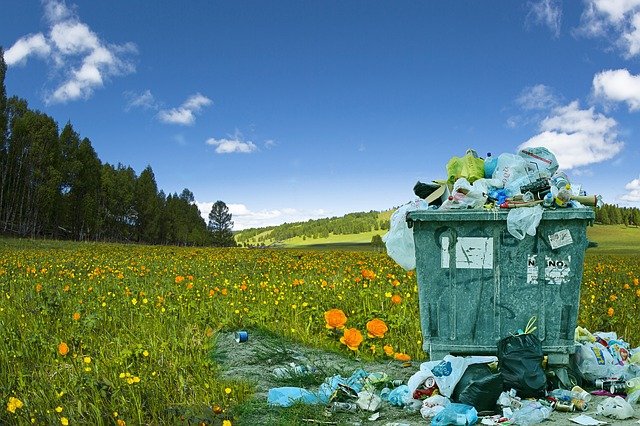Green Okinawa (15) Less Plastic Life

Dear OISTers,
In the spirit of learning from each other, the Resource Center is compiling information on being more environmentally friendly in Okinawa. Share your knowledge with us and we'll share it with fellow OISTers!
Plastic is incredibly useful; however plastic waste is a mammoth problem. Roughly half of all plastic products are designed to be used only once — and then thrown away (ref). If current trends continue, the UNEP (United Nations Environment Programme) estimates that there will be approximately 12 billion tonnes of plastic waste in landfills and the environment by 2050, and that the plastics industry could account for 20 percent of global oil consumption (ref).
Rivers carry plastic waste to the sea. It is estimated that today there are approximately 11.1 billion plastic items in the shallow coral reefs in the Asian-Pacific region alone (ref). Microplastic accumulates and persists in our ecosystems and is found in marine organisms, commercial seafood, and even bottled and tap water (ref). The presence of microplastics in our drinking water and food chain is a major health concern and an area of ongoing research.
We would love to hear your tips on reducing single use plastic and products you use that are made from recycled materials. Here are some tips from us.
Reduce plastic
Japan generates the second largest amount of plastic packaging waste per capita in the world (ref). Here are our tips on how to reduce the amount of plastic you use in your daily lives.
-
Take your own shopping bags to do your food shopping.
-
Choose food in polystyrene food trays as you can recycle them in Okinawa (see how in this Green Okinawa post, note, you cannot recycle plastic food trays like sushi trays).
-
Buy household products in refill packs.
-
Use alternatives to plastic, e.g.
-
Reusable silicon bags (link)
-
Beeswax wrap (link). You can even make them yourself (link). The OIST Recreation Services team held a beeswax wrap workshop on campus in March 2021 (see the photos in the gallery of this post)
-
Stainless steel and paper straws (link)
-
Bamboo dish washing brushes (link)
-
Bamboo toothbrush (link)
-
Green Leaf in Yomitan carries some plastic-free personal care items (link)
-
All sorts of homeware and personal care items that avoid plastic are sold by Mana (link). Mana items are also sold in Bacon Bar in Okinawa City (link).
-
Kits, homeware and self care items are sold by Econawa (link).
Kindly decline single-use plastic in shops and restaurants
I have my own, thank you Jibun no o motte masu. (自分のを持ってます。)
It is OK as it is Sono mama de (そのままで)
I do not need a bag, thank you Fukuro ha ira nai desu. (袋はいらないです。)
I do not need cutlery, thank you Spoon / Folk/ Ohashi ha ira nai desu. (スプーン、フォーク、おはしはいらないです。)
I do not need an ice pack, thank you Horei zai ha ira nai desu. (保冷剤はいらないです。)
I do not need napkins, thank you Napukin ha ira nai desu. (ナプキンはいらないです。)
I do not need a straw, thank you Sutoro ha ira nai desu. (ストローはいらないです。)
I do not need a cup, thank you Kappu ha ira nai desu. (カップはいらないです。)
Reuse with Re&Go
In early 2021, different restaurants and coffee shops in Yomitan (plus Hanahou in Kadena) pilotted take-out containers that can be washed and re-used as part of the ‘Re&Go’ service (link). At the time of writing, the businesses are evaluating the pilot.
Recycling plastic in Okinawa
Japan has a system for recycling PET plastic and plastic bottle caps. Rinse your empty PET bottle and recycle it at almost any supermarket in Okinawa. You can also recycle the plastic bottle cap, just make sure to take it off the bottle!
As far as we understand, there are no facilities to recycle other types of plastic in Okinawa. So avoiding single-use plastic where possible is the best option.
Buy recycled
-
Since 2020, the shoe brand TEVA has been making the straps on their sandals from recycled PET (link).
-
ECOLAF uses recycled PET and a variety of other recycled materials to make their clothes. Use the Japanese website to find their stockists in Japan (link).
-
UNIQULO has a small number of products made from recycled PET bottles. Not all their stores carry these products (link).
-
ECOVER makes household cleaning products and uses some recycled plastic in their packaging (link). A small number of products are available in supermarkets and pharmacies, with more available online (link).
-
Patagonia has a large range of clothing made from recycled polyester; check their Japanese site (link)
-
Kaeru Design transforms plastic waste washed up on the Japanese coast into jewelry (link). Kaeru items are also sold in Bacon Bar in Okinawa City (link).
Read other Green Okinawa posts in the series here
Contact us with your tips and Japanese products you know of that are made from recycled materials here
Photo credit OIST beeswax wrap workshop / Pete Linforth from Pixabay
The post was developed in collaboration with Mai Barnes (OIST Resource Center), Akiko Ishimine (OIST Resource Center), Yumi Asato (OIST Academic Program Team), and Kate Whitfield.
Photo gallery



